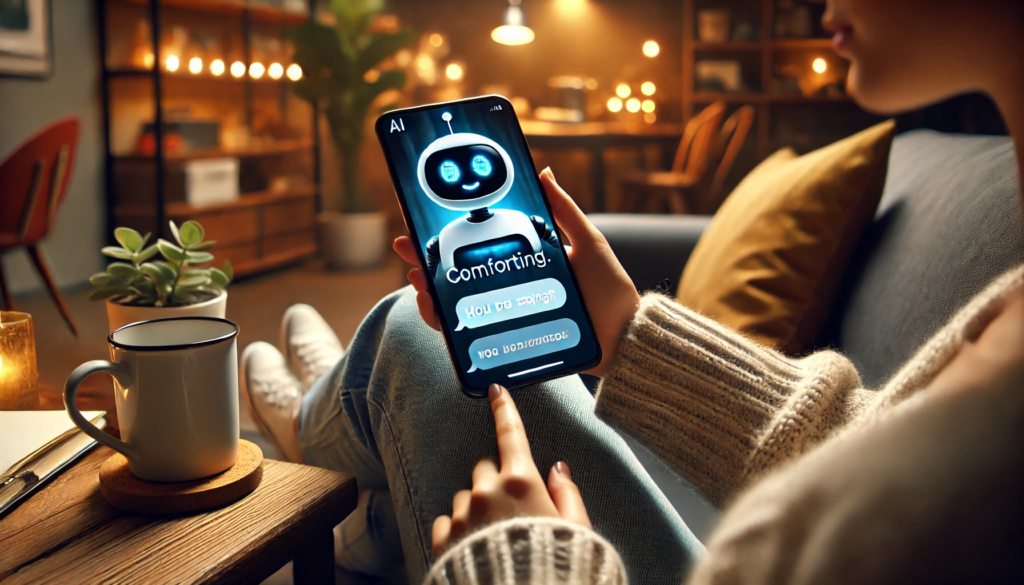Mental health has become a significant focus in today’s fast-paced world, where stress, anxiety, and depression affect millions. While traditional therapy remains essential, technology has stepped in to provide additional support. One such innovation is AI chatbots for mental health. These chatbots offer a confidential, accessible, and often free way to access mental health assistance anytime and anywhere.
In this article, we will explore how AI chatbots are transforming mental health care, their benefits, challenges, and real-world examples.

Table of Contents
What Are AI Chatbots for Mental Health?
AI chatbots for mental health are software programs powered by artificial intelligence (AI) that can engage in conversation with users, providing emotional support, advice, and techniques for stress management. They are designed to mimic human interactions using natural language processing (NLP), making conversations feel real and supportive.
These chatbots often act as first responders in times of mental distress, helping users manage their emotions or thoughts until they can access professional help. Unlike traditional therapists, AI chatbots are available 24/7, offering support without delay.
How AI Chatbots Work
AI chatbots operate by analyzing the text input from users. The process can be broken down into the following steps:
- User Input: A person types their thoughts, feelings, or questions.
- NLP Processing: The chatbot understands the message by breaking down the language and context.
- Response Generation: Based on the user’s message, the chatbot delivers responses that are pre-set or learned through AI algorithms.
- Learning and Feedback: Over time, AI systems improve by analyzing conversations and feedback, becoming more effective in offering support.
Many chatbots also incorporate cognitive behavioral therapy (CBT) techniques, helping users reframe negative thoughts and manage stress.
Benefits of AI Chatbots for Mental Health
1. Accessibility Anytime, Anywhere
Unlike traditional therapy, AI chatbots are available round the clock, allowing users to reach out anytime they need help. This can be especially beneficial for those in remote areas or with limited access to mental health services.
2. Anonymity and Privacy
Many people are hesitant to discuss their emotions with others due to fear of judgment. AI chatbots provide a safe and anonymous environment, making it easier for users to express their feelings without embarrassment.
3. Immediate Support
During moments of emotional distress, waiting for a therapy appointment can feel overwhelming. AI chatbots offer instant support, guiding users through breathing exercises, grounding techniques, or simply listening to their concerns.
4. Affordability
Many mental health chatbots are free or offer low-cost services, making emotional support more accessible to those with financial constraints.
5. Support Between Therapy Sessions
AI chatbots are not a replacement for therapy but can serve as valuable companions between therapy sessions. They remind users to follow routines, take medications, or engage in mindfulness exercises.
Real-World Examples of AI Chatbots
1. Woebot
Woebot is a popular mental health chatbot that uses CBT techniques to help users manage anxiety and depression. Through daily conversations, it encourages people to monitor their emotions and develop healthier thinking patterns.
2. Wysa
Wysa is another AI-powered chatbot that offers empathy and support through text-based conversations. It provides exercises for mindfulness and stress relief, making it a helpful tool for users dealing with anxiety.
3. Replika
Although Replika is not solely focused on mental health, it offers emotional support through meaningful conversations. Users create personalized chatbots that act as non-judgmental companions.
4. Tess
Tess is designed to support people with mild emotional challenges. It works in collaboration with therapists and coaches, ensuring users receive relevant help when needed.
Challenges and Limitations
While AI chatbots offer several advantages, they are not without limitations:
1. Limited Understanding of Complex Emotions
AI chatbots, despite advances in NLP, may struggle to understand complex emotional nuances. In severe mental health crises, they may not provide the depth of support that a human therapist offers.
2. Lack of Human Empathy
Although chatbots try to simulate empathy, they cannot replicate the warmth and connection of human interaction. Some users may find this lack of human touch disappointing.
3. Not Suitable for Severe Cases
Chatbots are not equipped to handle severe mental illnesses, such as schizophrenia or bipolar disorder. These conditions require professional treatment that AI tools cannot provide.
4. Data Privacy Concerns
Storing personal conversations in an AI system raises privacy concerns. Users need to trust that their data will be handled responsibly and not misused.
How Safe and Reliable Are AI Chatbots?
Many mental health chatbots undergo rigorous testing to ensure they deliver safe and effective support. However, users must understand that these tools are not substitutes for professional mental health care.
To ensure safety:
- Look for chatbots with certified mental health partnerships.
- Use chatbots that follow data protection laws, such as GDPR or HIPAA.
- Avoid sharing sensitive personal information through these platforms.
Future of AI Chatbots in Mental Health
The future looks promising for AI chatbots in mental health. As technology advances, we can expect more personalized and human-like interactions. In the coming years, AI chatbots may:
- Collaborate with therapists to create blended care models.
- Use voice-based interactions for a more natural experience.
- Offer multilingual support, making mental health care accessible worldwide.
- Integrate with wearable devices to track mental well-being in real-time.
Conclusion
AI chatbots for mental health offer a valuable first step toward emotional well-being. They provide immediate, anonymous, and affordable support, making mental health care more accessible to people worldwide. However, it is essential to recognize their limitations and use them as complementary tools alongside professional therapy.
In a world where mental health challenges are increasing, AI chatbots can play a vital role in supporting individuals and reducing the stigma around seeking help. With continuous advancements, these tools will likely become even more effective, offering compassionate and meaningful support when people need it the most.




